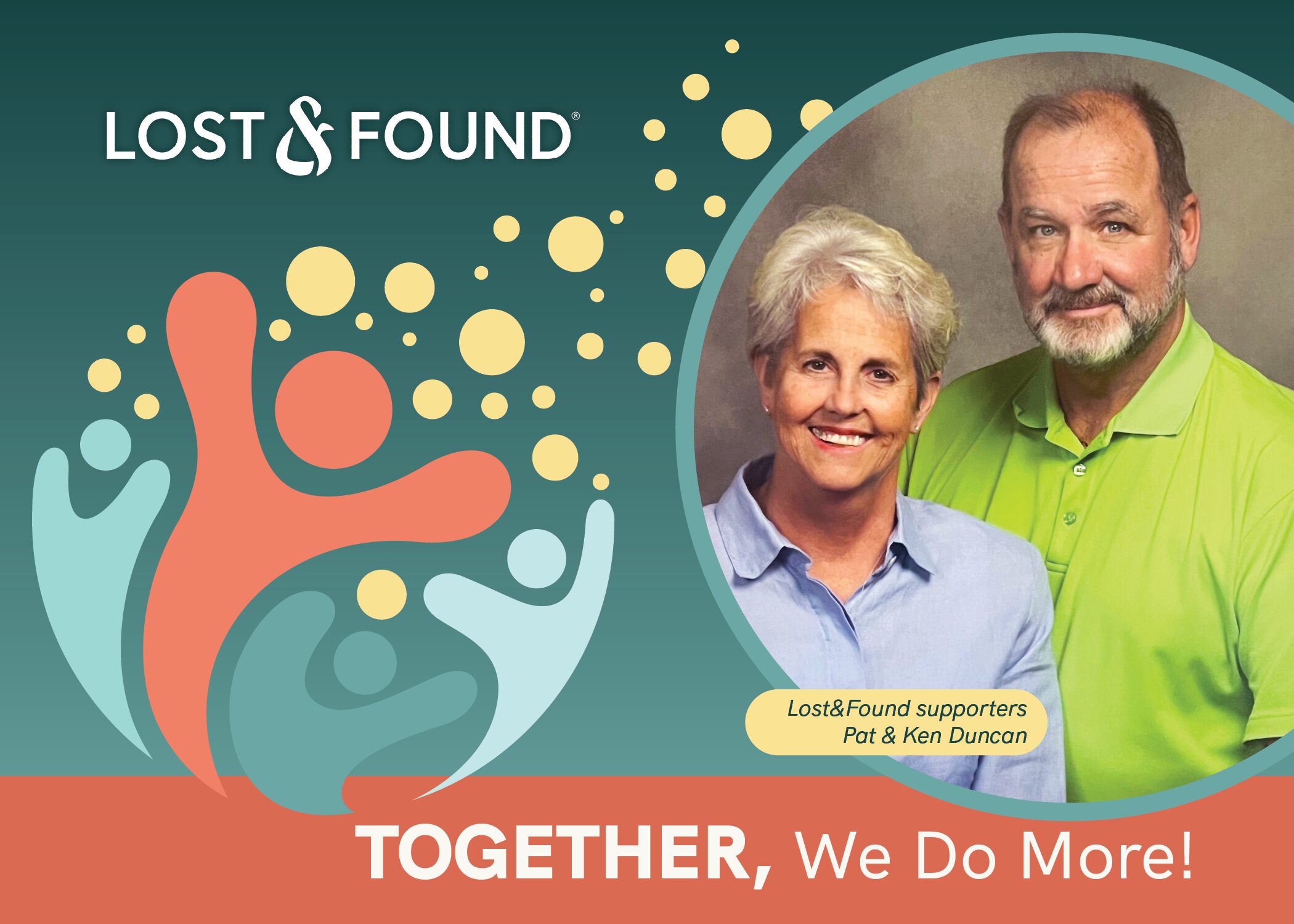Lost&Found supporters Ken and Pat Duncan know mental health education saves lives
Make an impact! Support Lost&Found with a recurring donation today.
Ken and Pat Duncan lost their 27-year-old daughter, Abbey, to suicide in 2010. She was an avid environmentalist; a mentor to other young women studying Buddhism; and a hydrologist for the City of New York doing brownfield remediation, finding success and respect in a male-dominated industry of developers.
“How do you go from being that impactful to, for lack of a better word, losing your way in life? And it happened very, very quickly,” Ken said. “As an outsider looking in … we’ll never really know.”
This personal experience of loss changed his perspective on mental health.
“It opens up a whole new world, a whole new awareness,” he said. “Things that were foreign to you are no longer foreign to you.”
At the time of his daughter’s death, Ken had spent nearly 30 years working in financial services. The loss of their daughter made him realize just how many people, including some portion of those he had contact with as a manager and executive through those years, struggle with their mental health.
Ken, who, with Pat, lives in Luck, Wisconsin, sees that people are dealing with a lot more today than they were in the time when he and previous generations were growing up.
“Of course, my parents and grandparents grew up through some very traumatic times as well, but they had a completely different way of approaching their lives,” he said. “It was much more family-based, much more community-based. People weren’t as dispersed as we all are today. You really were part of the community, part of a village. In today’s world, you’ve got all these things pulling people apart as opposed to bringing people together.”
His daughter’s death made him see this clearly.
“When it is personal, when it is close, then you start to really understand how you could have applied (this knowledge) differently historically—but more importantly, how do you try to apply it going forward?” Ken said.
One avenue for applying his new perspective was serving on the board of People Incorporated, an organization that started serving the homeless more than 55 years ago and now provides mental health services to about 14,000 people in the Twin Cities. “I learned a lot by being a part of that organization—their approach to treating the whole person, not just the physical, but the mental and physical aspects of our health,” he said.
Pat found healing through several mediums, including art. She now leads a Wellness Through Art workshop several times each summer. “I think everybody who has the personal impact of living through (a suicide loss) in some way is also contributing back in different ways,” he said.
Some of the Duncans’ contribution also goes to supporting Lost&Found. Pat and Ken believe in Lost&Found’s mission; Ken sees that it is sharing information and skills that he wishes he would have had earlier in his own life.
“The whole idea about Lost&Found is to broaden the base of knowledge and understanding (of mental health issues), and at the same time, build community,” Ken said. “It’s a way to have a set of resources available to people at a much younger age to think about how to cope with whatever challenges they are facing in life.”
For those who want to see change on issues they care about, supporting nonprofits like Lost&Found is vitally important, according to Ken.
“Building out organizations like Lost&Found is critical to the well-being of our society and our communities,” he said. “They are not properly funded on the public level. And so these organizations need a tremendous amount of private support from those of us who have the capability to do it. You know, it doesn’t have to be a lot of money—it just has to be consistent. Sustainable. A challenge for organizations like Lost&Found is finding sustainable funding sources so they can continue to have an impact in the communities they are serving.”
The goal—both in terms of fundraising and programming—is to keep moving forward.
“It’s small steps, but you just need a lot of them. You need a lot of small steps to make an impact. That’s what Lost&Found is building, one campus at a time and one person at a time,” Duncan said. “Strengthening the overall health of one person strengthens the overall health of the community.”
There is no single solution to suicide, but through collaborative, strategic actions, we can reduce suicide risk and save lives.1 Together, we do more.
Lost&Found is the leading youth and young adult suicide prevention and postvention nonprofit of the Northern Plains, directly serving 47 communities and more than 15,000 people each year.
Our proven track record in the fight against suicide faces new challenges as federal and state funding for prevention efforts is under attack.
Our next generation, and their families, depend on our work and the hope it brings. Suicide prevention doesn’t wait for the next federal or state grant cycle. Lives depend on this work.
Now, more than ever, we need your help. Will you join us today and support our next generation?
Your donation supports this work:
STUDENT PROGRAMS:
We deliver resilience education programs and train mental health peer mentors for youth and young adults.
RESEARCH & EVALUATION SERVICES:
We assess campus and workplace suicide prevention capacity and develop action plans.
EDUCATION & POLICY:
We provide education, training, and policy guidance to strengthen systems and raise community awareness of mental health needs.
SURVIVORS JOINING FOR HOPE:
We deliver support for suicide loss survivors through financial assistance and connections to resources.
Make your mark on mental health! Support Lost&Found with a recurring donation today.
WORDS OF SUPPORT
FOR LOST&FOUND
“I think (Lost&Found’s Peer2Peer Mentorship) program is super beneficial because it gives you a different perspective and opens your mind in terms of how humans need each other when we are struggling, and that it’s okay; it is okay to feel you need help and it is okay to ask for it and feel supported.”
—Student at Bethany Lutheran College
“Lost&Found’s Campus Postvention services have been an invaluable resource for a campus that prioritizes community and culture like South Dakota Mines. Lost&Found provided the perfect blend of pre-existing structure and space for our staff team to begin the process of creating a custom Postvention Guide for our campus. The end result is a comprehensive, compassionate, and sensitive checklist that campus officials can use in the event that our campus community ever loses a student or employee.”
—Joseph Dlugos, Dean of Students, South Dakota Mines
“If I could tell the world or everybody about Lost&Found—just the resources, the people … I would strongly recommend them. It felt really good to know that there was somebody there that understood what we were going through and (could) point us in the right direction.”
—Charity, who was helped by Survivors Joining for Hope after her brother died by suicide in 2022
1 https://www.cdc.gov/suicide/pdf/preventionresource.pdf, page 12. Lost&Found’s suicide prevention and postvention programs align to CDC protocols and State of South Dakota Suicide Prevention priorities.

